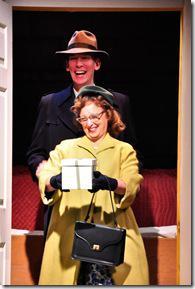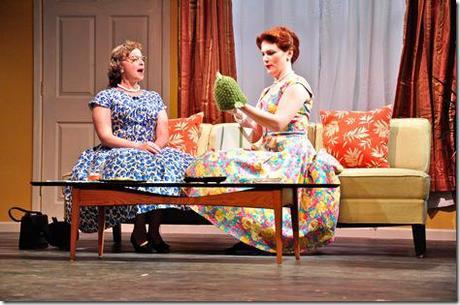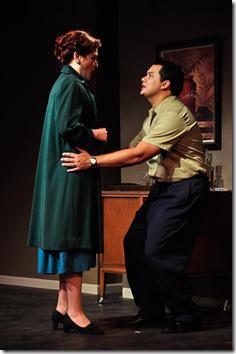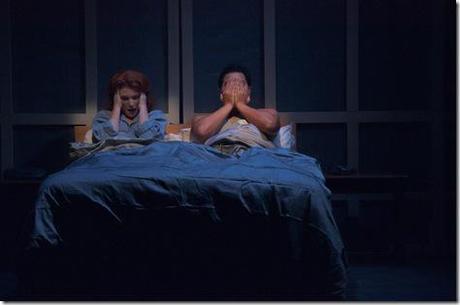
Maple and Vine
Written by Jordan Harrison
Directed by Damon Kiely
Noyes Cultural Center, Evanston (map)
thru Dec 4 | tickets: $25-$40 | more info
Check for half-price tickets
Read entire review
An intriguing concept loses its way in overdone decade

Next Theatre presents
Maple and Vine
Review by Keith Ecker
In Kurt Vonnegut’s acclaimed war novel “Mother Night,” the wry and witty author delivers the message that "We are what we pretend to be, so we must be careful what we pretend to be." This quote about the pliability of identity and the troubles an affectation can cause quite neatly encapsulates what Maple and Vine tries so laboriously to get at. Unfortunately, the Next Theatre production lacks the poetic simplicity of Vonnegut and instead gives us an intriguing concept that is executed in a fairly dull and outlandish manner.

And I say outlandish because the characters’ motivations that drive them to repress their true identities don’t justify the extent to which they are wiling to compromise their lives. Am I really to believe that a sophisticated New York literary agent would sacrifice her entire self-identity just to inhabit a world that more closely resembles Ozzie and Harriet’s? Or what about the fact that her husband joined her and assumed a false personality merely to fall in line with his wife? Or what about the coupled gay men who separated and repressed their sexuality all for the sake of a social experiment?
The play’s dicey plot is told in two very uneven acts. The first act tells the story of how the big city couple, Katha (Molly Glynn) and Ryu (Peter Sipla), are slowly but surely convinced to part with their urban abode and high-paying jobs for a simpler life at the Society of Dynamic Obsolescence, a cult-like community in the Midwest that not only lives as if it were still 1955 but actually forces themselves to believe it’s still 1955. The couple that conducts the sales pitch are community leaders Dean (Lawrence Grimm) and Ellen (Jenny Avery). With his well-tailored suit and her conservative ankle-length dresses, the two look like textbook examples of a 1950s husband and wife.
The second act takes us inside the gates of the community where we see Katha and Ryu adjusting to their new routines and their new identities. Hesitant at first, Katha quickly discovers that she enjoys the simplicity of filling the niche role of housewife. Meanwhile, Ryu begins to take satisfaction in his job at the box-making factory. But all is not swell in this sleepy suburb. Dean harbors a dark and shameful secret, one that threatens to tear the community apart. And when a vandal begins defacing community property with strange messages, Dean must make a choice to either commit to his role as the goodly neighbor or leave and reclaim his old self.
Nothing quite works for the production. Besides the poorly executed story, Damon Kiely‘s direction is imprecise. Characters’ personalities waver too easily from scene to scene. I blame this on a lack of intelligent subtext and subtlety that would greatly lend itself to the believability of the characters. Furthermore, this lack of believability quashes our sympathy, and so we are left with a bunch of erratic characters who serve as vehicles for a story that we care little about.
Without good direction, it can be difficult to accurately assess acting as the two are so interlinked. I will say that I enjoyed Grimm and Avery’s cheerfully robotic addresses to the audience, which describe the antiquated community and lay out its strange rules. These scenes serve as little comedic sketches and are the most entertaining part of the production.
Lampooning the 1950s is like kicking a dead horse. The decade has been ridiculed and used as a metaphor for repression over and over again. Maple and Vine adds nothing to this image. And while the concept of a gated community that is one part cult and one part time capsule has legs, the story and direction aren’t enough to carry it.
Rating: ★★
Maple and Vine continues through December 4th at Noyes Cultural Center, 927 Noyes, Evanston (map), with performances Thursdays at 7:30pm, Fridays and Saturdays at 8pm, and Sundays at 2pm. Tickets are $25-$40, and are available by phone (847-475-1875 x2) or online at printtixusa.com. (check for half-price tickets at Goldstar.com). More information at NextTheatre.org.

All photos by Manny Ortiz
artists

